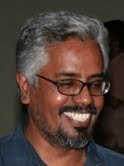Remembering Ayyappa Panicker
Missing - An Atmosphere
How does one understand and come to terms with the departure of someone like Ayyappa Panicker?
Many of the young poets who are my friends feel that they didn’t do enough for him, that they haven’t properly acknowledged what he had done for them in lighting and clearing their path, in teaching them to be irreverent, and inspiring them to have the courage to stand alone, fearless of beauty and truth
Many obituaries will be written about him, but the void he left behind would remain. For, he was a whole atmosphere. He was one who spurned any kind of ‘following’ and he never followed any isms. Derided by the ‘progressives’, adulated by the shallow, he traveled ahead and afar, most often alone. He was one who was able to love and show concern to another without showing off. Like his poetry, his love was also subtle and tender; it also took time for one to understand it.
Very rarely has a writer/intellectual conducted himself with such pride and self confidence in Kerala, given its habitat of extreme conservatism on the one and polemics on the other. Maybe it was his acerbic sense of humour that he helped him to keep his head and mind above the averaging muck of malayalee discourses and public life. Cosmopolitan in the deepest sense of the term, he was never swept away by ‘waves’. Instead, they seemed to ‘unfangle’ themselves for him. Firmly rooted in his own land, history and tradition, he easily integrated and addressed them. His book on Indian Medieval Literature, Thakazhi, C V Raman Pillai and the series on Poetic Aesthetics are some of the best written in any language. With our looks locked westwards, we may only begin to take note of them only when they get translated and get quoted back to us by our icons.
He was the silent but a deeply motivating force behind all the aesthetic shifts and breaks that happened during the last decades in Malayalam arts and literature. His early poems shook Malayalam poetry from its romantic and ideological slumber, waking it up into a whole new world of experiences and visions. He inspired and virtually moulded a brand new generation of poets, publishing them and releasing their minds to the world outside. His Kerala Kavita was a unique publication of its kind, juxtaposing the best of world and Indian poetry with the local yearnings toward the new skies. He was a poet who broke all the rules and prompted others to, he experimented with all the genres and styles, and was never weighed down by his past or any assumed image of his own. But for him, nobody could have thought of Maharaja Series or the Cartoon poems as poems. Impatient with the run of the mill, Panicker transmitted this sense of frisson noveau into other arts too, like theatre and cinema. He was the moving force behind the resurgence in these fields, both of them witnessing an efflorescence of talents during the 70’s fired by a new vision and sensibility.
He was a translator par excellence, both of the West, generations and traditions, both classical and folk. (To paraphrase Zachariah, tradition is the clay one has to stamp with one’s foot to soften and shape, not something to carry on the head) His poetry and his writings on aesthetic theory straddle all these worlds easily. He looked at tradition from the here and now, and the contemporary from traditional perspectives He was not enamoured of them nor did he iconise any. In his works, both creative and analytical, he confidently uses the best of all these traditions to portray, dissect and reinterpret contemporary life and living. In this many-way process, he brought a fresh lease of life to traditional arts like Koodiyattam and to contemporary art forms..
With his irrepressible energy to renovate and renew himself constantly through his creative endeavours, he inspired our generation with his impatience for staid and reified forms, and irreverence towards all forms of authority and adulation.
He was always ready to set his sails towards uncharted destinations. Never anchoring himself in any ideology, establishment or masterpiece, he traveled lightly, spreading light and making light of the heavy baggage that everyone around him carried.
This is how he described himself to a visitor at the hospital, “Now I am ‘Vayyappa Panicker”. And who else could have written/sung ‘Muthuveli Pappachante Makal petta Rosilikku Muthuvankulangara ninnoru manavalan vanne…”? Only a Kutta-nadan whose foot is planted firmly in the soil and whose mind is open to the whole world.
C S Venkiteswaran


2 Comments:
i do sometimes do write in malayalam
see this issue of bhashaposhini
for my piece on 'mobile malayalee'
Will u please get me the lyrics of "Muthuveli Pappachante Makal petta Rosilikku"
Post a Comment
Subscribe to Post Comments [Atom]
<< Home